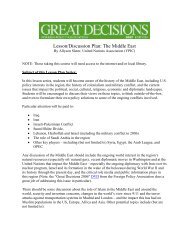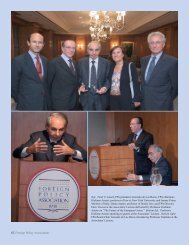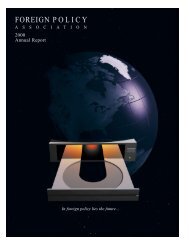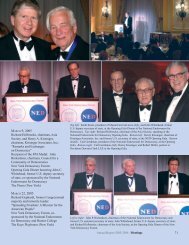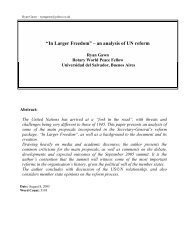Celebrating 90 Years - Foreign Policy Association
Celebrating 90 Years - Foreign Policy Association
Celebrating 90 Years - Foreign Policy Association
Create successful ePaper yourself
Turn your PDF publications into a flip-book with our unique Google optimized e-Paper software.
Relations Between Russia<br />
and the United States<br />
74 | FOREIGN POLICY ASSOCIATION<br />
(Continued)<br />
the problem of Iran’s nuclear program, like any<br />
other international problem, cannot be resolved<br />
by force. Therefore, there is no alternative to<br />
a political and diplomatic settlement. Iran<br />
is undergoing a political process that can be<br />
influenced positively only through engagement.<br />
We should have learned the lesson of how<br />
dangerous it is to artificially create rogue states<br />
and to refuse to provide equal security for all.<br />
We can hardly prevent mistaken steps<br />
if someone is determined to take them, but<br />
we will feel sorry if our partners make a<br />
hasty choice in resolutions concerning Iran or<br />
unilateral independence for Kosovo. The real<br />
question is whether the United States, Europe,<br />
the Middle East, and the entire international<br />
community can afford such moves.<br />
It is quite telling that appeals to build<br />
pressure on Iran, while leaving no options on<br />
the table, were voiced precisely at the moment<br />
when the International Atomic Energy Agency<br />
obtained Tehran’s pledge and commitment<br />
to resolve the important issues related to its<br />
nuclear program. Let us not forget that a similar<br />
situation existed in 2003 vis-à-vis Iraq, when<br />
the IAEA was not given a chance to complete<br />
the work it had begun, and the so-called<br />
coalition of the willing, in circumvention of the<br />
U.N. Security Council, undertook to accomplish<br />
the mission. By the way, coalitions of the<br />
willing do not constitute multilateralism. They<br />
are simply a group of countries subscribing to<br />
decisions already made by somebody else. As<br />
Fyodor Dostoyevsky wrote, they are “longing for<br />
submission to somebody else’s will.” I think that<br />
true multilateralism is found not in the number<br />
of participants, but rather in the modalities of<br />
their participation. Multilateralism implies<br />
joint analysis from the very beginning, joint<br />
decision-making, and consequently, shared<br />
responsibility. If this approach had been applied<br />
in respect to, say, Iraq, I think the results could<br />
have been different.<br />
As for Iran, we started working in the<br />
format of six countries, and at the very<br />
beginning, we agreed to work on a collective<br />
basis and within the U.N. Security Council. The<br />
Council included three countries in Europe, the<br />
United States, Russia, and China. However, in<br />
addition to our mutually developed plan, which<br />
has been endorsed by the Security Council and<br />
has begun to bring results, the United States<br />
and some European countries have announced<br />
unilateral and obviously disproportionate<br />
sanctions against Iran. Such steps absolutely<br />
damage the common course.<br />
Our relations with the European Union<br />
have suffered from what I would call collective<br />
unilateralism. The new members of the EU<br />
seem to be mesmerized by their numbers,<br />
and each of them may demand solidarity with<br />
everyone else on any individual problem. As<br />
a result, we encounter a bloc position, and<br />
we find this bloc position not only when we<br />
negotiate directly with the EU, but also when<br />
we negotiate in the United Nations, in the<br />
Coalitions of the willing do not<br />
constitute multilateralism. They<br />
are simply a group of countries<br />
subscribing to decisions already<br />
made by somebody else.




